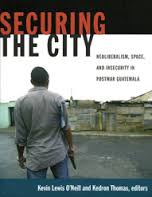Author: Edited by Kevin Lewis O’Neill and Kedron Thomas
ISBN No: 978-0-8223-4958-7
Review date: 19/04/2024
No of pages: 220
Publisher: Duke University Press
Publisher URL:
http://read.dukeupress.edu/content/securing-the-city.tab-info
Year of publication: 16/02/2011
Brief:
Securing the City: Neoliberalism, Space, and Insecurity in Postwar Guatemala
Securing the City: Neoliberalism, Space, and Insecurity in Postwar Guatemala. Edited by Kevin Lewis O’Neill and Kedron Thomas.
While the full title of Securing the City might be offputting, or suggest that the subject is quite narrow, the book does serve to give a vivid introduction to the central American country, and indeed the region. If you are tasked with working in Guatemala or a similar country, the book will give a scholarly insight into what makes the place tick and, despite all its predicaments, the extreme poverty and the murders, it holds itself together. Although the authors will argue that neoliberalism – a free market that favours capital and entrepreneurs – has free rein.
This book covers urban experience in living memory, going back to the 1930s to show the changes since, from near civil war to gang-related violence that has proved beyond the state’s power or the corrupt police’s ability to control. Hence so many armed security guards, as businesses and the well-off seek to protect themselves, that have a chapter to themselves.
Incredibly, perhaps, to the westerner, if you consider by western standards how chaotic and violent the modern Guatemala City is, many of its security guards are landless peasants, migrating to the city for the first time, and maybe not even much able to speak Spanish. Though the work is risky and takes the men from their families, they do it – though maybe leaving to take a break or for any better-paid work – because it pays comparatively well, and regularly, and compared with the land the standing around is easy. The academic authors see neo-liberalism as exploiting such a ‘flexible labour pool’. While that is debatable, the authors do set out the ‘revolving door’ of young men switching agencies, partly using the guard work ‘as a means to experience Guatemala City’: “Men take advantage of the security guard industry to expand their economic and other horizons …” For men in their 20s able and willing to see something of the world, is it any different in Mexico City, or Los Angeles or London? These guards are at the same time connected to the urban landscape they are paid to protect – though they made be looked down on by the users of hotels, restaurants and so on – and the rural homes they come from; and they’re disconnected as they feel excluded from the wealth they see while on shift. It’s an interesting chapter that shows how the guards aren’t mere victims of neoliberal economics but make choices; being a security guard is (relatively) desirable. Separately, the book looks at how a society responds to such widespread violence, including against women. whether paying for private security and gated communities and shopping malls (as beloved of neoliberal theorists), or even lynching. While off the point of private security, the book is also good and useful for surveying the social geography of Guatemala City, as people react to and make sense of the dangers.
As the authors say, unprecedentedly high crime rates have made Guatemala City one of the most dangerous cities in the world. After a peace process that ended central America’s longest and bloodiest civil war and saw the transition from a state-centric economy to the global free market, Guatemala’s neoliberal moment is now strikingly evident in the practices and politics of security. Postwar violence has not prompted public debates about the conditions that let transnational gangs, drug cartels, and organised crime thrive. Instead, they argue, the dominant reaction to crime has been the cultural promulgation of fear and the privatisation of what would otherwise be the state’s responsibility to secure the city. Hence, the book suggests, the visible and heavy security in the city is neoliberal.
About the authors
Kevin Lewis O’Neill is Assistant Professor in the Department and Centre for the Study of Religion at the University of Toronto. He is the author of City of God: Christian Citizenship in Postwar Guatemala and a co-editor of Genocide: Truth, Memory, and Representation, also published by Duke University Press. Kedron Thomas is a doctoral candidate in the Department of Anthropology at Harvard University.










